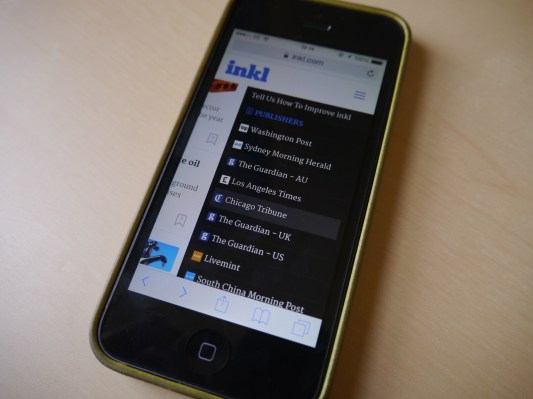Australian startup Inkl is hoping to fix journalism’s broken strained business models with a ‘Spotify for news’ model that ditches the unwelcoming and irritating single publication paywall in favor of aggregated news content from multiple publishers which users access ad-free for a small (10c) per article fee. Or gain unlimited access to all the news they fancy by paying a monthly $15 subscription.
Inkl, which was founded last January, is following in the footsteps of Dutch startup Blendle, which is also applying a marketplace model to journalism, albeit it’s not just focusing on news — going after longer form magazine content too. Blendle pulled in a $3.8M Series A investment this October, backed by multiple large media businesses.
Newspaper publishers may have been slow to adapt traditional print businesses for the web but the rise of mobile devices and the parallel popularity of consuming digital media on the go is providing ample impetus — and opportunity — for news publishers to shake things up. (Related: there is some serious money sloshing around for delivering news in novel ways — witness BuzzFeed’s $50M raise this summer, and Vice Media selling a pair of $250M stakes this year at a $2.5BN valuation, for instance, albeit the biggest bucks are focused on video content.)
Inkl’s team has been bootstrapping development thus far, taking in a small seed round of $250,000 this fall, led by North Base Media whose principal, Marcus Brauchli, is the former managing editor of The Wall Street Journal and Executive Editor of the Washington Post.
The team launched the Inkl web app last month. Native apps are in the works, due to launch in late January. Inkl’s founder and CEO is Gautam Mishra, the former director of strategy for Australian media giant Fairfax Media.
Ad-free news stories — at a price
After signing up and logging in to the Inkl web app on their mobile device, the user lands straight into an ad-free feed of news stories, badged with publisher logos and parceled into sections such as local, politics, technology and an editor’s choice. There’s an element of content personalization — given that users can choose which publishers they want to see in certain sections. But it’s intentionally pretty light touch.
“Having a product that felt perfectly ready to use without having to spend time setting up demanding personalisation preferences was really important to us, given that seemed to be something users were missing with popular free news aggregators,” says Inkl’s VP of marketing, Helen McMurdo, when I ask about how its personalization works. “We know that our audience fears missing out on the important news — that’s part of the need that Inkl delivers on. So it’s against our interests to over personalise: what we’re trying to is provide users with a full perspective.”
Inkl has signed up seven publishers to its aggregated, ad-free news pipe so far — namely: The Guardian (U.S., U.K. and Australian editions), The Washington Post, The Chicago Tribune, Los Angeles Times, The Sydney Morning Herald, LiveMint, and South China Morning Post. It says discussions are ongoing with additional publishers to further expand its content sources. The startup’s business model is a revenue split with publishers but it’s not disclosing what proportion it takes. Nor how many paying customers it has at this nascent stage.
And therein lies the rub. The question for Inkl remains whether enough mobile owning news junkies can be persuaded to pay for stories, even at 10 cents a pop, when the same content is liberally available elsewhere on the web for free. Ultimately, if they pay, they will be paying for the convenience of an ad-free news hit. And the ability to consume a pipeline of diverse and diverting news nuggets without having to expend any effort wading through digital background noise — on social feeds or elsewhere on the web — to ferret out the same content.
Whether that’s compelling enough a proposition for Generation Free to cough up some bucks remains to be seen. To try to get readers hooked on its news pipe Inkl is doing what it must: offering a free 30 day trial.
